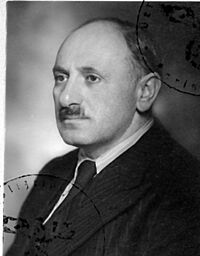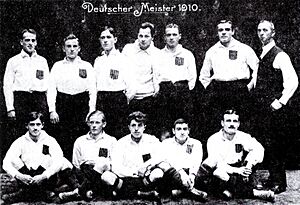Julius Hirsch facts for kids

Hirsch in 1938
|
|||
| Personal information | |||
|---|---|---|---|
| Date of birth | 7 April 1892 | ||
| Place of birth | Achern, German Empire | ||
| Date of death | declared dead 8 May 1945 (aged 53) | ||
| Place of death | Auschwitz-Birkenau, German-occupied Poland | ||
| Position(s) | Left winger | ||
| Youth career | |||
| 1902–1909 | Karlsruher FV | ||
| Senior career* | |||
| Years | Team | Apps | (Gls) |
| 1909–1913 | Karlsruher FV | ||
| 1913–1919 | SpVgg Fürth | 32 | (27) |
| 1919–1925 | Karlsruher FV | ||
| International career | |||
| 1911–1913 | Germany | 7 | (4) |
| *Club domestic league appearances and goals | |||
Julius Hirsch (born April 7, 1892 – declared dead May 8, 1945) was a Jewish German football player. He was an Olympian and played for the Germany national football team. Sadly, he was murdered at Auschwitz concentration camp during the Holocaust.
Julius Hirsch helped his team, Karlsruher FV, win the German football championship in 1910. He also played for the German national team at the 1912 Summer Olympics. Later, he joined SpVgg Fürth and won another German championship with them in 1914.
Contents
Early Life and Football Career
Julius Hirsch was born in Achern, Germany. His family was Jewish, and he was the seventh child of a merchant. When he was ten years old, he joined the football club Karlsruher FV.
Julius, along with teammates Fritz Förderer and Gottfried Fuchs, formed a strong attacking group. People called him "Juller." He was a fast and powerful midfielder or striker. He was known for his strong left foot and powerful shots. His skills helped Karlsruher FV win the 1910 German football championship.
In 1913, Hirsch moved to SpVgg Fürth. The very next year, he helped them win the 1914 German football championship. This showed he was a top player in Germany.
Playing for Germany
Julius Hirsch made history as the first Jewish player to join the Germany national football team. He was only 18 when he first played for Germany in 1911. He played in several important matches, including the 1912 Olympic Games in Stockholm, Sweden. In 1912, he scored four goals in one game against the Netherlands. This made him the first German player ever to score four goals in a single match.
Service in World War I
Hirsch bravely served in the German Army for four years during World War I. He was honored with the Iron Cross for his service. His brother, Leopold, also fought for Germany and died in the war in 1918.
After the war, Julius Hirsch returned to Karlsruher FV. He played until 1925, when he retired from playing. However, he stayed with the club as a youth coach, helping young players learn the game.
Life During the Nazi Era
On April 10, 1933, Julius Hirsch read in a newspaper that all clubs in Southern Germany would ban Jewish members. After being a member for over 30 years, Hirsch chose to leave Karlsruher FV. He wrote a letter to his club. In it, he asked them to remember that many Jewish people had been loyal patriots and had given their lives for Germany.
As the Nazis gained power, life became harder for Jewish people. In 1938, Hirsch's children, Esther and Heinold, were forced to leave their school. In 1941, they had to wear the yellow star. In 1942, Hirsch divorced his non-Jewish wife. He did this hoping to protect her and their children from the Nazis.
Death and Legacy
On March 1, 1943, Julius Hirsch, then 50 years old, was sent from Karlsruhe, Germany, to Auschwitz concentration camp. He had believed that the government would not harm him. After all, he had fought for Germany in World War I and played for the national football team.
His exact date of death is not known. In 1950, a German court officially declared him dead. They set his date of death as May 8, 1945. It is thought that he may have died very soon after arriving at the camp. In February 1945, his children were sent to Theresienstadt. They were freed by the Red Army in May 1945.
Remembering Julius Hirsch
Since 2005, the German Football Federation has given out the "Julius-Hirsch-Preis" award. This award honors people in German football who show great examples of teamwork and acceptance.
In January 2020, Chelsea FC unveiled a special mural at their Stamford Bridge stadium. The mural was created by Solomon Souza. It is part of Chelsea's 'Say No to Antisemitism' campaign. The mural shows images of footballers like Julius Hirsch and Árpád Weisz. Both were killed at Auschwitz concentration camp. It also features Ron Jones, a British prisoner of war known as the 'Goalkeeper of Auschwitz'.
See also
- List of select Jewish football (association; soccer) players
- List of people who disappeared
Images for kids
 | Aurelia Browder |
 | Nannie Helen Burroughs |
 | Michelle Alexander |



